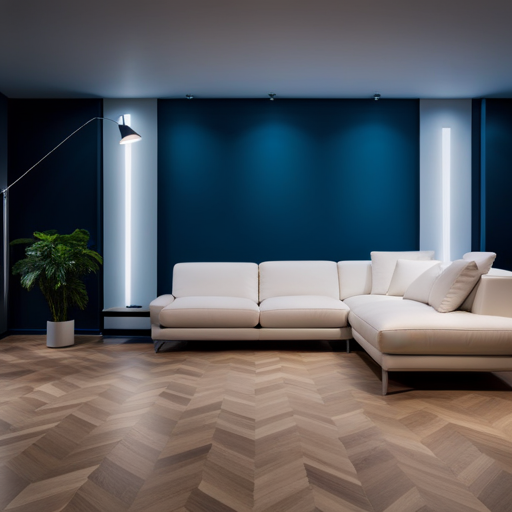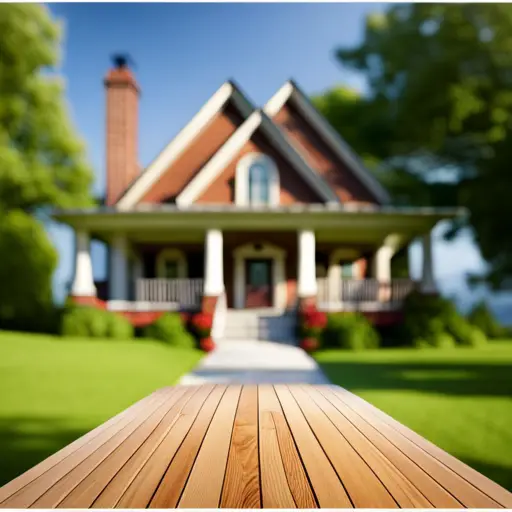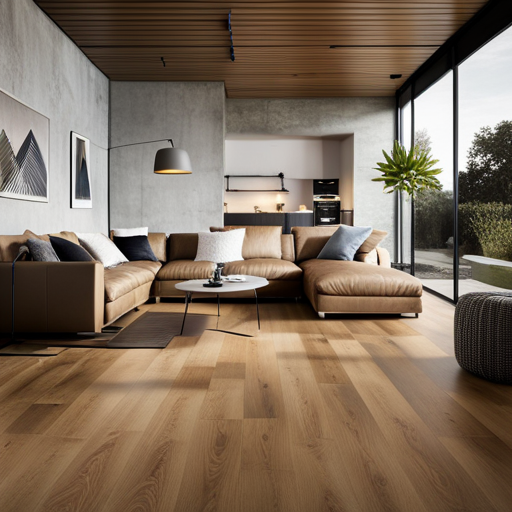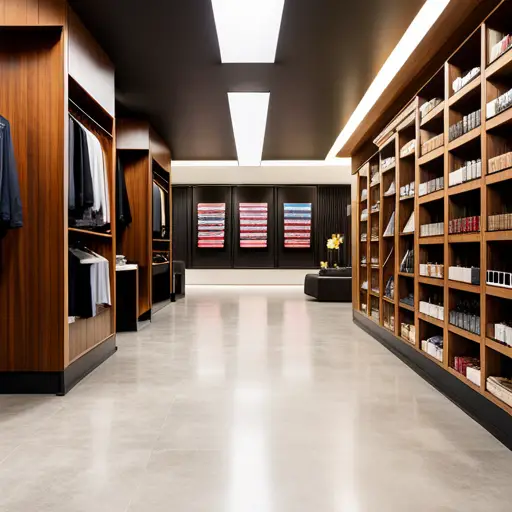The Future of Smart Flooring in Real Estate

Step onto the cutting edge of real estate with smart flooring, where innovation meets functionality.
As technology continues to revolutionize the way we live and interact with our surroundings, smart flooring is poised to become a game-changer in the industry.
From enhancing energy efficiency to integrating seamlessly with smart home systems, the future of real estate lies in the sustainable, safe, and intelligent design of smart flooring.
Join us as we explore the transformative potential of this emerging trend.
Advantages of Smart Flooring in Real Estate
Smart flooring in real estate offers enhanced property management capabilities, improved energy efficiency, and personalized user experiences, positioning it as a valuable investment for property owners and developers.
The integration of smart flooring technologies can lead to substantial cost savings for property owners, as these systems can optimize energy usage, reduce maintenance costs, and minimize the need for frequent replacements.
By leveraging sensors and data analytics, smart flooring can contribute to early detection of maintenance issues, allowing for timely intervention and preventing potential damage, thereby preserving the property value.
Additionally, the ability to personalize user experiences through features such as adjustable heating, interactive lighting, and integrated security systems enhances the overall appeal of the property, thereby increasing its market value.
Furthermore, the operational efficiencies and sustainability offered by smart flooring solutions align with the growing demand for eco-friendly and technologically advanced properties, attracting environmentally conscious tenants and buyers, which can further contribute to the property’s value.
Integration With Smart Home Systems
With its seamless integration into smart home systems, smart flooring enhances the overall technological ecosystem of a property, enabling a cohesive and interconnected network for efficient management and personalized user experiences.
This integration involves the incorporation of smart flooring and automation technologies into existing smart home systems, providing a unified platform for controlling various aspects of the property.
Additionally, connectivity plays a crucial role in ensuring that smart flooring systems can communicate with other smart devices within the home, facilitating seamless data exchange and enhancing overall system functionality.
Furthermore, data privacy measures are paramount in the integration of smart flooring with smart home systems, ensuring that sensitive information collected by the flooring sensors is securely managed and protected from unauthorized access.
Lastly, the interoperability of smart flooring with different smart home systems and devices is essential for creating a versatile and adaptable technological environment that can cater to diverse user preferences and requirements.
Impact on Energy Efficiency
The integration of smart flooring and automation technologies into existing smart home systems not only enhances property management and user experiences but also significantly impacts energy efficiency within real estate spaces. Smart flooring, equipped with sensors and actuators, can contribute to energy savings and have a positive environmental impact. By using advanced sensors, smart flooring can detect occupancy and adjust lighting, heating, and cooling systems accordingly, resulting in reduced energy consumption. Furthermore, the data collected from smart flooring systems can provide valuable insights into energy usage patterns, allowing for more efficient energy management and optimization of resources. This not only lowers operational costs for property owners but also reduces the overall environmental impact of real estate spaces. The following table illustrates the potential impact of smart flooring on energy efficiency:
| Energy Efficiency Benefits | Description |
|---|---|
| Energy Savings | Smart flooring adjusts energy usage based on occupancy, reducing waste. |
| Environmental Impact | Data insights lead to optimized energy management, lowering environmental footprint. |
Safety and Health Benefits
As we explore the future of smart flooring in real estate, it’s crucial to consider the safety and health benefits it brings.
Smart flooring technology can significantly impact indoor air quality, providing a healthier environment for occupants.
Additionally, features like slip and fall prevention embedded in smart flooring systems contribute to creating safer living and working spaces.
Indoor Air Quality
A significant consideration for real estate developers and homeowners is the impact of smart flooring on indoor air quality and the associated safety and health benefits. Smart flooring technology plays a crucial role in enhancing indoor air quality. Here are key aspects to consider:
-
Air quality monitoring: Smart flooring integrates sensors to monitor indoor air quality, detecting pollutants and allergens, thus contributing to a healthier indoor environment.
-
Health implications: Improved indoor air quality due to smart flooring directly impacts respiratory health, reducing the risk of allergies and respiratory illnesses.
-
Environmental impact: Smart flooring materials are often eco-friendly, reducing the use of harmful chemicals and promoting sustainable practices in real estate development.
-
Regulatory compliance: Smart flooring aligns with emerging regulations focused on indoor air quality, positioning properties to meet evolving health and safety standards.
Slip and Fall Prevention
An integral aspect of smart flooring technology is its role in mitigating slip and fall incidents, thereby enhancing safety and health within indoor environments.
Advanced safety technology embedded in smart flooring systems includes features such as slip-resistant surfaces, impact-absorbing materials, and real-time monitoring to detect potential hazards. These innovations contribute to injury prevention by reducing the risk of accidents, particularly in high-traffic areas or spaces prone to spills or moisture.
By prioritizing slip and fall prevention, smart flooring not only safeguards occupants and visitors but also minimizes liability for property owners and managers. Furthermore, the implementation of such safety measures fosters a sense of security and well-being, promoting a healthier indoor environment.
Transitioning into sustainable materials and design, the integration of safety technology with eco-friendly flooring solutions further exemplifies the multifaceted advantages of smart flooring in real estate.
Sustainable Materials and Design
Sustainable materials and design in smart flooring are paramount for environmentally conscious real estate development. Incorporating sustainable innovation and eco-friendly materials in smart flooring not only reduces the environmental impact but also aligns with the growing demand for sustainable and green buildings.
Here are four key aspects to consider when discussing sustainable materials and design in smart flooring:
-
Renewable Resources: Utilizing materials that are derived from rapidly renewable resources, such as bamboo or cork, helps in reducing the reliance on finite resources and promotes sustainable forestry practices.
-
Recyclable Materials: Opting for smart flooring that is made from recyclable materials ensures that the flooring can be repurposed at the end of its lifecycle, reducing waste and environmental impact.
-
Low VOC Emissions: Choosing smart flooring with low volatile organic compound (VOC) emissions contributes to better indoor air quality and a healthier living or working environment.
-
Energy Efficiency: Smart flooring designs that integrate energy-efficient features, such as thermal insulation or underfloor heating systems, contribute to overall energy savings and sustainability in real estate development.
Cost Considerations and Return on Investment
When considering smart flooring in real estate, it’s essential to analyze both the initial cost and the long-term return on investment.
Smart flooring may have a higher upfront cost, but it offers a value proposition through its durability and energy-efficient features, potentially leading to cost savings over time.
Understanding the affordability and long-term benefits of smart flooring is crucial for real estate professionals and property owners seeking to make informed decisions.
Smart Flooring Affordability
Considering the cost implications and return on investment, implementing smart flooring in real estate has become a pivotal consideration. The affordability of smart flooring is a crucial factor for its widespread adoption, especially given the increasing market demand for sustainable and technologically integrated properties.
Here are key points to consider:
-
Cost-Benefit Analysis: Smart flooring may have a higher initial investment, but its long-term benefits, such as energy efficiency and reduced maintenance costs, often outweigh the upfront expenses.
-
Market Competitiveness: As the demand for smart features in real estate rises, incorporating smart flooring can enhance the market competitiveness and overall property value.
-
Financial Incentives: In some regions, there are financial incentives, such as tax credits or rebates, for integrating eco-friendly and energy-efficient features, including smart flooring.
-
Lifecycle Cost Evaluation: It’s essential to assess the lifecycle cost of smart flooring, factoring in installation, maintenance, and potential upgrades.
Considering these affordability considerations and market demand, the long-term value proposition of smart flooring becomes increasingly evident.
Long-Term Value Proposition
Amid the growing demand for sustainable and technologically integrated properties, a meticulous assessment of the long-term cost implications and return on investment of smart flooring is integral to its value proposition in real estate. Smart flooring offers long-term durability, reducing the need for frequent replacements and maintenance, which can result in significant cost savings over time. Additionally, the aesthetic appeal of smart flooring enhances the overall property value, contributing to a positive return on investment. To emphasize this point, consider the following comparison:
| Factor | Smart Flooring | Traditional Flooring |
|---|---|---|
| Longevity | High | Moderate |
| Maintenance Costs | Low | High |
| Aesthetic Appeal | Modern and Versatile | Limited Options |
| Property Value | Enhanced | Standard |
| Return on Investment | Positive | Neutral to Negative |
The long-term cost-effectiveness and enhanced property value make smart flooring a compelling choice for real estate investments.
Moving forward, it is crucial to explore the future trends and innovations in smart flooring to better understand its potential impact on the real estate industry.
Future Trends and Innovations
The emergence of advanced sensor technology and sustainable materials is shaping the future trends and innovations in smart flooring for real estate. As the real estate industry embraces the integration of technology and sustainability, several key developments are expected to drive the future of smart flooring:
-
Enhanced Sensor Capabilities: Future technologies will enable smart flooring to have advanced sensor capabilities, allowing for real-time monitoring of foot traffic, temperature, and even air quality within a space.
-
Integration with IoT: Smart flooring is poised to integrate seamlessly with the Internet of Things (IoT) ecosystem, enabling automated responses to environmental changes and occupant preferences.
-
Personalized Design and Functionality: Market trends indicate a shift towards customizable smart flooring solutions that cater to the specific needs and preferences of occupants, such as adjustable firmness or temperature control.
-
Circular Economy Practices: Innovations in smart flooring will increasingly focus on utilizing recycled and eco-friendly materials, aligning with the growing demand for sustainable real estate solutions.
These future trends and innovations are set to revolutionize the real estate industry, offering not only enhanced functionality and efficiency but also contributing to a more sustainable built environment.
Frequently Asked Questions
How Does Smart Flooring Impact the Resale Value of a Property?
Smart flooring can significantly impact the resale value of a property. Its advanced technology and aesthetic appeal can enhance the overall look and feel of a space, thus increasing the appeal and value of the property.
Can Smart Flooring Be Customized to Match Different Interior Design Styles?
Customization options for smart flooring allow seamless integration with different interior design styles. The versatility of materials and finishes provides a wide array of options, although cost considerations and the installation process should be carefully evaluated.
What Are the Long-Term Maintenance Requirements for Smart Flooring?
Long-term durability of smart flooring is dependent on material quality and proper maintenance. Regular cleaning and maintenance with manufacturer-recommended methods are essential. This ensures the flooring’s longevity, preserving its aesthetic and functional properties over time.
Are There Any Privacy Concerns With the Integration of Smart Flooring and Smart Home Systems?
When integrating smart flooring with smart home systems, it’s important to consider privacy implications and data security. As these technologies collect and transmit data, safeguarding personal information becomes critical to maintain trust and compliance.
How Does Smart Flooring Contribute to Reducing Carbon Footprint in Real Estate?
Smart flooring, through its integrated energy-efficient features, contributes significantly to reducing the carbon footprint in real estate. By optimizing heating and cooling, and utilizing sustainable materials, smart flooring aids in lowering energy consumption and lessening environmental impact.
Conclusion
In conclusion, the future of smart flooring in real estate presents a promising landscape of innovation and efficiency.
Despite the potential benefits, the irony lies in the fact that the true impact of smart flooring may not be fully realized without addressing the underlying challenges of cost, integration, and sustainability.
As the industry continues to evolve, it is essential to approach these advancements with a critical lens to ensure they align with the broader goals of real estate development.

Rubin Everest, a seasoned expert in the world of flooring, brings a wealth of knowledge and passion to the surface. As the mind behind ebbow.com, Rubin is dedicated to sharing insights on the latest trends, innovative solutions, and expert advice in the realm of flooring. Whether you’re seeking practical tips for installation or design inspiration, Rubin Everest is your go-to source for all things flooring-related, making your journey to the perfect floor an informed and enjoyable experience.





